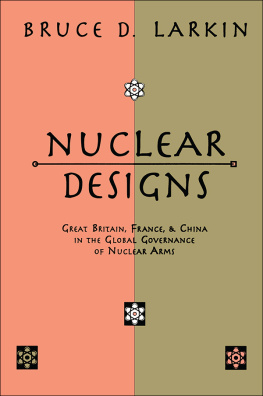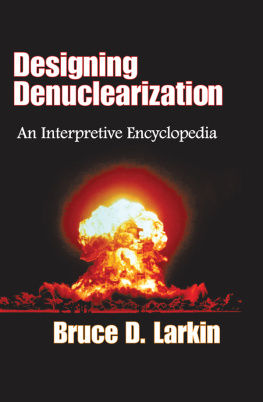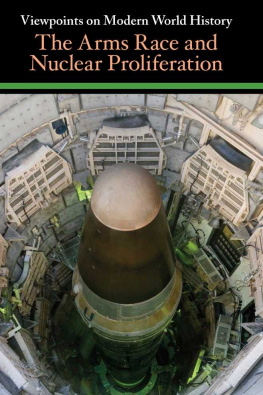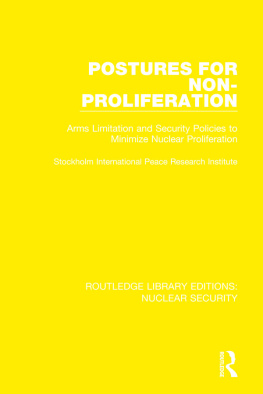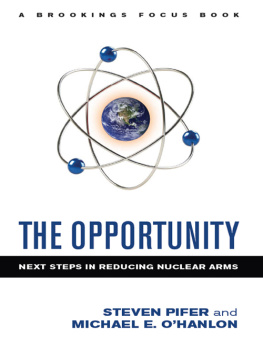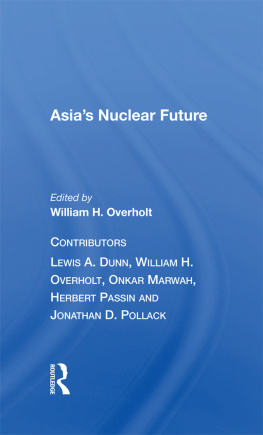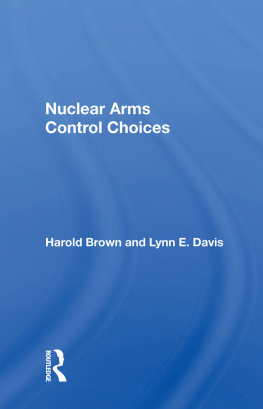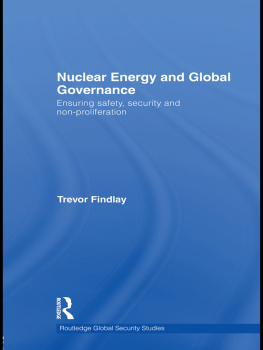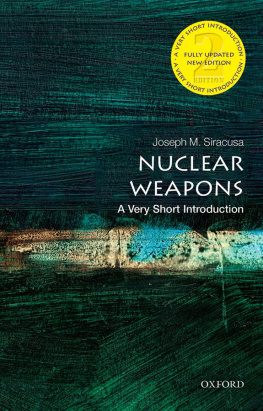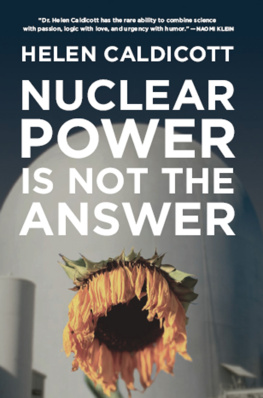First published 1996 by Transaction Publishers
Published 2017 by Routledge
2 Park Square, Milton Park, Abingdon, Oxon OX14 4RN
711 Third Avenue, New York, NY 10017, USA
Routledge is an imprint of the Taylor & Francis Group, an informa business
Copyright 1996 by Taylor & Francis.
All rights reserved. No part of this book may be reprinted or reproduced or utilised in any form or by any electronic, mechanical, or other means, now known or hereafter invented, including photocopying and recording, or in any information storage or retrieval system, without permission in writing from the publishers.
Notice:
Product or corporate names may be trademarks or registered trademarks, and are used only for identification and explanation without intent to infringe.
Library of Congress Catalog Number: 95-23279
Library of Congress Cataloging-in-Publication Data
Larkin, Bruce D., 1936-
Nuclear designs : Great Britain, France, and China in the global governance of nuclear arms / Bruce D. Larkin.
p. cm.
Includes bibliographical references and index.
ISBN 1-56000-239-5 (alk. paper)
1. Nuclear weaponsGovernment policyGreat Britain. 2. Nuclear weaponsGovernment policyFrance. 3. Nuclear weapons-Government policy-China. 4. Nuclear arms control. 5. Nuclear nonproliferation. 6. World politics1989- I. Title.
U264.5.G7L37 1995
327.174-dc2095-23279
CIP
ISBN 13: 978-1-56000-239-0 (hbk)
The Cold War has given way to new concerns for global security policy. Nationalism, authoritarianism, economic uncertainty, local wars, and puzzlement about collective action dominate the new agenda. Still, Cold War legacies persist. Among the most vexing are nuclear programs, stocks, and deployments.
We invoke here only as a memory the keen edge of fear associated with the nuclear Cold War. Nonetheless, the five declared nuclear weapon statesUnited States, Russia, Britain, France, and Chinacontinue to modernize their forces and deploy them, ready for use. Others have followed suit, or aspire to do so. Few doubt that development continues in Israel, Pakistan, and India. The nuclear intentions of North Korea, Iraq, and Iran are subject to scrutiny.
There is, however, a new candor in USRussian nuclear relations, which makes possible frank conversation about the utility and dangers of nuclear arms.
The Choices
At this unexpected conjuncture lies a choice among alternative nuclear futures. If the Cold War inoculated states against a return to runaway nuclear arming, the choices come down to three: the status quo, disengagement, or abolition. Measures of calculated disengagementwithdrawing tactical nuclear weapons, removing nuclear weapons from surface ships, shifting away from land-based strategic missiles with many warheads, force reductionshave already been carried out by Russia and the United States. More such measures are promised. These are welcome, but they take place in a context which confirms status quo nuclearism. Only if prompt use is rendered impossiblea radical disengagement including non-deploymentcould nuclear weapon states insulate themselves against risks of use inherent in deployed forces. Arguments along these lines might appeal to those who reject status quo nuclearism but hesitate to abandon a trump card playable in some uncertain future. They might also appeal to those who anticipated that proposing multilateral abolition would open them to charges of naivet and treason. But advocates of abolition argue that the surest, clearest, and most enforceable security against nuclear war lies at zero, not in half measures. This text does not attempt to resolve the issue between radical disengagement and abolition. Instead, observing the contradiction between the weapons states nuclearism and the norm of non-proliferation, it argues that the claim that nuclear weapons in a few hands are safer than nuclear weapons in no hands should be subject to close and wide scrutiny. Stronger, it argues that nuclear weapon states have a compelling obligation to explore and consider alternatives to status quo nuclearism.
Our point of entre into global nuclear issues lies through the nuclear weapons programs of Britain, France, and China. This text explores how their substantial capabilities and declared purposes bear on choices for a nuclear future, and shows how each of them justifies the status quo. Britain and France say their nuclear forces are key to their security in the present and in future worlds. China would not give up her force except as part of a comprehensive renunciation. The text introduces the arguments they offer for their weapons and sets out the nuclear establishments, political institutions, concerns, and public views which illuminate their belief that nuclear weapons serve their interests.
The conclusion we are compelled to draw is that the three minipowers not only reinforce nuclearismin which nuclear war is held at bay by terror and uncertain self-restraintbut also by their example complicate the case against proliferation. If they should decide, instead, that abolition or agreed and safeguarded non-deployment would in fact enhance their security, they could make the case to Russia and the United States as no others could make it. It would become possible as a pragmatic matter to bring the two preeminent nuclear states into an abolition or non-deployment regime, and they could make a compelling case that others should renounce nuclear deployment and nuclear aspiration.
Nuclearism and the Nuclearist State
We define nuclearism as the belief that the state achieves net advantage from holding nuclear weapons. The nuclearist state would choose to maintain a nuclear force even if all other states declared they would not.
But does that actually characterize the five self-acknowledged nuclear weapon states? The first difficulty is that declaratory policy has taken quite the other position. In some statements, at least, each of the five has said its long-term objective is global denuclearization-while stressing the obstacles and preconditions which must be met. The second difficulty is that all explain their programs primarily as programs to deter (or dissuade) other nuclear-armed states from nuclear threats or attack. As long as other states appear committed to keeping their forces deployed, nuclear weapon states have no need to explain clearly whether they are nuclearistsin our senseor not.
Still, the five seem to be following a path in which the question of abandoning nuclear deployments is never posed. It is in this sense that we are on solid ground in describing them as servants of the status quo. Even their modest measures of disengagement protect their core strategic nuclear forces from political criticism. In this status quo world, some reductions in warheads would occur, especially as large forces obsolesce. Cuts could be recorded in agreements modeled on SALT and START and proliferation codified in adjustments to the NPT. Despite the appearance of control and reduction, however, over the yearsmore slowly than predicted thirty years ago, but inexorably nonethelessmore states would succeed in arming themselves with nuclear weapons.


